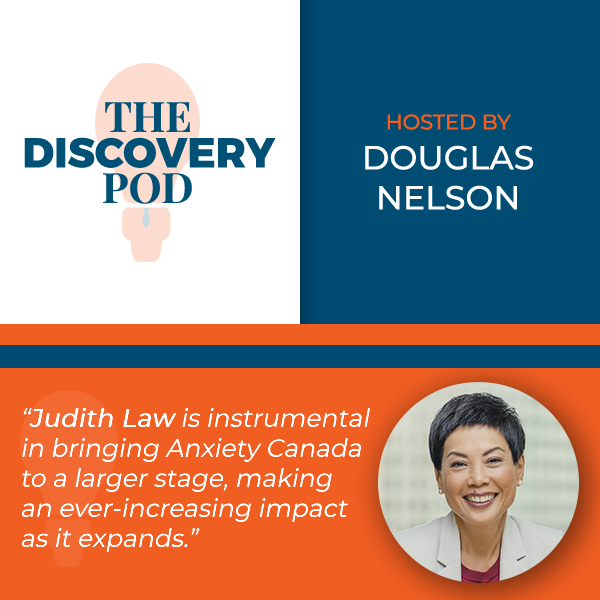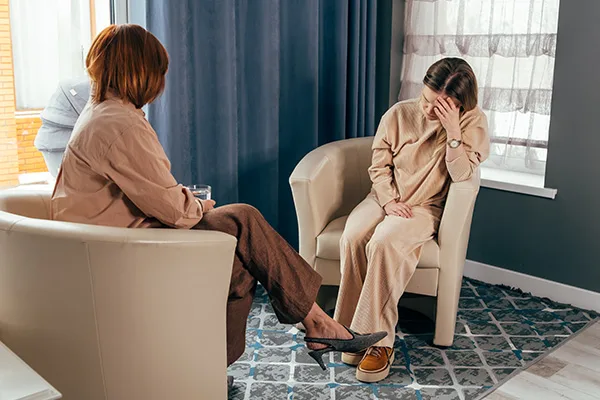
Anxiety disorders have increased dramatically over the past several years. Today we speak with a leader who is making a difference in helping Canadians who are struggling with anxiety. Judith Law, CEO of Anxiety Canada, joins host Douglas Nelson, to share the role anxiety plays in our communities and the commitment Anxiety Canada has made in providing free, reliable and accessible tools. She also reveals how the organization grew from being BC-based to a national organization improving the lives of thousands. Tune in to listen to the work that Judith Law is leading with Anxiety Canada.
—
Listen to the podcast here
Anxiety Canada With Judith Law, CEO
In this episode, we have Judith Law. She is the CEO of Anxiety Canada. In our conversation, she talks about the role of anxiety in our lives and the commitment that her organization has to putting tools in the hands of those who need them through digital platforms right across the country. She talks about how her organization grew from being a BC-based charity to one that has impact and operations right across the country. If you’re an organization committed to providing service, wanting a reminder, a lesson, and an example of how to stay rooted in your values, or if you’re interested in expanding your empire across the country, you’re going to love this conversation with Judith Law. Welcome, Judith.
It’s my pleasure. Thank you.
It is great to have you join the show. I know many of our readers are going to benefit from our conversation. Before we get into it, can you tell our audience about Anxiety Canada and who you serve?
Anxiety Canada is a national charity and we are the only one that is committed to all things anxiety, anxiety management, anxiety disorders, and its related disorders. By that, I mean OCD and PTSD. We serve the Canadian public. We are a consumer-facing organization.
One of the most common misconceptions of anxiety is that it’s just stress or that it’s a choice that people make or people are wired that way. How do you go about educating and meeting people where they’re at in their understanding of anxiety and all of its implications?
Understanding Anxiety
I love that you’ve asked this question because we start our talks and we give talks in the community. We do them virtually online. We have three anxiety courses, which are self-paced anxiety courses for adults, parents, care providers, and educators. We also have the MindShift App, which is an anxiety management tool that is entirely based on evidence. Also, we always start with the cycle education part.
By that, we try to normalize anxiety. We explain that anxiety is normal and it can even be protective. If we didn’t have anxiety, we would die. Anxiety disorders though are different. When anxiety is interfering, it’s stressful and it’s preventing you from enjoying everyday life from going to school, from going to work, and from participating in events that other people seem to be able to have to enjoy, then there’s more than just regular anxiety.
I assume that there’s still a lot of stigma around anxieties. There is so much of mental health. As CEO, do you ever get frustrated by that stigma or get tired of running into that wall day after day?
I don’t get tired of it. I’ve been here for a few years and I suppose I love talking about mental health and educating people about how they are in charge of mental wellbeing is exciting for me and remains so. I think where the conversations need to go when we talk about de-stigmatization, the flipside is empowerment, which is that we can’t control our thoughts and we can’t control accidents. Things that happen and uncertainty are all around us, now more than ever it feels like we’re entering into an extended period of uncertainty since COVID, but even more so, we need to build our knowledge and have the tools at our disposal so that we can control the things that we can control.
We need to build our knowledge and have the tools at our disposal to control the things we can control. Share on XSpeaking of tools, one of the things that’s impressive, anyone who’s been on your website or knows the organization at all can see a real dedication and focus on putting tools in the hands of people who may be dealing with an anxiety disorder or managing one. As CEO and as an organization, how did you come to determine which tools were needed and how do you go about getting them into the hands of those who will benefit most from them?
That’s a big question in so many parts. The decision is difficult because as with all charities, you have finite resources, and we don’t sell any products. It’s back to our mission. Our mission is to reduce the barrier of anxiety so people can live their lives to the full and as well as our values. For example, if we make people jump through a lot of hoops, they need to fill out an assessment form, they need to answer all those questions before we share the tool, and then they’re less likely to use it.
I would say that the Principle of Universal Access and ensuring that people aren’t having to pay for or need to pass some test or need to get consent, particularly when you’re a young person, those are fundamental to health literacy. However, in terms of tool selection, it’s a good question and it’s one that excites me because our app was the direct result of our youth webpage. It was receiving over 100,000 visitors a few years ago.
At that time, we decided that a mental health app focused specifically on anxiety and managing anxiety might be the best way or investment of our finite resources to reach people, especially given the ubiquity of technology and then the waitlist. Speaking of barriers, there’s also the cost barrier and getting one-to-one help. That’s another reason why we developed the app and why we have such a large digital footprint.
Anxiety, there is an app for that.
Mindshift CBT App
Yes, our MindShift CBT App is totally free. It was developed by people with lived experience with anxiety and also by experts whose research and clinical work is all about anxiety and anxiety disorders. It’s a cognitive behavior therapy-based app, and anyone who can read in English or French can download it from Google Play or from the Apple Store. It’s free and it also has a community feature in it.

Anxiety Canada: Mindshift CBT is a cognitive behavior therapy-based app developed by people with lived experience with anxiety and experts whose research and clinical work are all about anxiety disorders.
I’ll do a little plug about the community feature. During the pandemic, it was very helpful and continues to be helpful because when it comes to mental health, there is stigma as you mentioned so you truly feel that you are alone in your suffering or that I’m the only crazy person who has these thoughts. You will rarely say to someone, “I feel so anxious about going to the birthday party.”
We’ll happily talk about stressors and we’ll say, “I’m having a little bit of a stressful day,” but stressors cause anxiety. Just as you open up Google Maps to get somewhere, the app is there on your phone once you’ve downloaded it and you can jump into the community. You can go anywhere in the app because we don’t track you and we make no money from our app. We’re not asking you to buy anything. We’re not saying, “Doug, how are you feeling,” and asking for more information about you. However, there is a symptom checker. There are visualizations. There’s a lot that you can use to help you and you can engage with other people once you’re in the app.
Has it been hard to resist the need to monetize that app at all? I’m sure you probably had some helpful suggestions for people outside saying, “You could probably make money to fund some of your programs if you had a fee for that.”
We’ve been so reluctant, and it is because of our core value around universal access because there will be readers that we’ve been fortunate to have a good team developing grants. We’ve had support from one financial institution and one foundation, but we’re not a technology company. We’re a bunch of do-gooders who are leaders in developing digital tools and digital tools like apps are not static. Our consumers become more demanding because they want edutainment. Keeping up with the Joneses increasingly becomes difficult. When I say keeping up with them, I mean giving consumers the level of engagement that they’re getting used to does become increasingly challenging financially.

Anxiety Canada: Giving consumers the level of engagement they get used to becomes increasingly challenging financially.
One of the other great stories that you tell is one of the great ways you engage the community through your podcast, #OurAnxietyStories. Tell our readers a little bit about that podcast and what the goal of connecting to the community is.
Our Anxiety Stories
Thank you. #OurAnxietyStories interviews people from all walks of life in Canada. We’ve had politicians, comedians, and students come on the podcast. It’s an opportunity for them to share their mental health journey. It always starts with, “Tell us about your anxiety story.” Even people who are reluctant to speak about anxiety, they’ll come on the podcast and they’ll say, “I’d love to be on the podcast to speak about my family member with anxiety,” and that’s perfectly great.
However, eventually they’ll also almost always share that they’ve had these episodes in their life where they’ve been anxious, where they’ve lost sleep, or where they have lost their appetite. It makes it so real and the podcast is again, easily accessible because people listen to the podcast while they’re driving or they’re on the bus to an interview.
Suddenly, it is so relatable that you’ve got that sinking feeling. You’ve got the clammy hands and your heart’s racing because you are having to go for a job interview. The person that you’re listening to on the podcast is sharing those very same symptoms. As I’m talking with you, and I’ve heard podcasts on with the Discovery Group and they were very validating, I think that’s part of it too, is the validating part.
It’s listening to people talk about the issues that you’re dealing with. Our show is about social profit leadership and yours is about people managing anxiety. However, I think there’s something powerful that the medium has in it to allow people to see themselves as the individuals that they’re listening to.
Yes, it’s very relatable and it creates space for reflection, if not during, but afterwards. You’re listening, you’re catching those nuggets, and you hold onto them. I know I do and the feedback we’ve received from listeners because we evaluate. We send out surveys for each season. The feedback that we get is that they share certain episodes that resonate with them. They’re not remembering the whole episode. They’re remembering specific things that one person said that they’ve unpacked over time.
I think it is impressive that any of our readers who are interested, should certainly go to the Anxiety Canada website to have a look at all of these digital tools. I think all of our readers can feel free to make #OurAnxietyStories their second or third favorite podcast after our show, of course, Judith, but there is a lot of value there. The reason I’m asking these questions is we work with a number of organizations across the spectrum of health that have client service as a part of what they offer to their organization. It could be advocacy and research and other things as well.
Your organization stands out as one that seems directly connected to the community and has made that significant investment. Maybe you could tell us a story of how the organization came to make that significant investment. We talked about what you have available, but why is that available and how did you come to around your board table or around your management table to emphasize this connection to the community the way you have?
Anxiety disorders are the most prevalent mental health condition in Canada and worldwide. It affects one in four people, but there’s been a lot of misunderstanding about anxiety disorders and its related disorders like OCD. In fact, we don’t have enough trained clinicians to serve all the people who need help. These are people with severe anxiety. This organization came about because there used to be a center at UBC and that center was where there were services for in-patient. There were outpatient and inpatient services.
Anxiety disorders are the most prevalent mental health condition in Canada and worldwide. Share on XYou’d get diagnosed, you would see an expert, and receive treatment. That center closed. That is why. Those psychologists who were part of that publicly funded center then with parents who had children in that center decided that they wanted and needed a society, a charity that would be community-oriented that would fill that gap in some way. Uncertainty is all around us and uncertainty is fundamental to why we experience anxiety.
Our work in the community is because we know that anxiety, as I said, we all have anxiety. It’s in all of us and we can learn to manage anxiety. If we have symptoms that are interfering, then they need to be helped. There’s help for people who have moderate to severe anxiety. As a community organization, we’re about the evidence-based too.
We say, “Anxiety disorders are highly treatable.” That’s evidence-based, and it’s cognitive behavior therapy. There are also some other modalities. Most people don’t know that. They just suffer in silence. Together, we can address these issues not just by talking, but by learning. It’s building our knowledge and skills and then tapping that friend or family member to say, “You might want to listen to this podcast,” or, “There’s an app,” and helping them get to a place where they can seek help if they need it.
I think that commitment to putting the tools into the hands of the people who need them is impressive. You talked a little bit about the founding of the organization. It hasn’t always been Anxiety Canada. It started as Anxiety BC. We’ve worked with a number of organizations that work across the country, certainly, national health organizations, but also with a couple of organizations who started it in BC and are on the road to being national organizations.
From that experience, I can tell you something, I’m sure you know better than me, which is what a long hard road that is to move from a provincial organization to a national organization. Tell us a little bit about what that process was and start from what’s the impetus to move from the borders of British Columbia to right across Canada.
In 2018, our board met many times for strategic planning, and we realized from our data that we were serving a lot of people across the country, especially those in other provinces. Although we’re one of the few national charities, at the time, we’re Anxiety BC, Anxiety BC’s resources were used by people in Ontario and Alberta. There were, at the time only two, and now still only two provincial charities that are committed to anxiety disorders.
One in Manitoba and one in Ontario. They were the only two active ones. Also at the same time, the CEOs of these two provincial anxiety disorders associations and Anxiety BC and I were the CEO, the Executive Director for Anxiety BC at the time, and we served on the National Anxiety Disorders Association of Canada Board. That national board was looking to have a greater presence, but our chair was diagnosed with cancer and he and the board decided that it would be best if we looked at dissolving the organization.
At the same time, Anxiety BC was looking to rebrand itself to serve all Canadians and to formalize where we would allocate resources to being a national charity. The timing was right, and the board voted in favor of transferring its assets to Anxiety BC provided that we were going to become a very active and engaged anxiety disorder association in Canada.
Judith, you’ve described that as a very straightforward process. One A to B, C to D as you go down the line. I’m sure there were a few curve balls that came through in that process, but it reflects that commitment that you’ve shared a couple of times about putting tools in the hands of the people who need them. Also, the values and the drive of the organization positioned you so well to move from a provincial to a national organization. What was one of the first things you learned or what were some of the biggest learnings that you had as you went from Executive Director of Anxiety BC to CEO of Anxiety Canada?
I love this question because it’s amazing to aspire to great things, doing the work, and building the team is a core part of it. To be completely candid, I think that we were extremely inspired and ambitious, and we continue to try to have a national presence. We do it digitally. We’ve scaled up an online therapy program that’s called MindShift Groups, but there are different regulatory environments across Canada, as you have alluded to. There are different needs as well. I’ll say that we’re continuing to build partnerships and focusing on collaboration and coordination is a core part of being national.
It's amazing to aspire to great things. And doing the work and building the team is a core part. Share on XJudith, I can just jump in there. You’re not allowed to tell people what to do as the national CEO. You don’t have command and control.
If only it were just a red button.
I find whenever I’m looking for the red button or the “Just solve this button,” it’s usually not my best self that’s looking for that button knowing it’s always more complicated and more human than a simple button.
You are absolutely right, and we’re so fortunate. I feel incredibly privileged to have a board of directors that are across Canada. That was part of our expansion. We also recruited and selected scientific advisors, not just in Canada, but over the years we’ve expanded to three continents. We have volunteers who are experts in mental health, specifically in anxiety disorders, anxiety, and its related disorders in the UK, Australia, the US, and Canada, who advise who represent our organization. Also, these are volunteers. We also have a national youth committee. I’m grateful and humbled every day that they give of their time, their expertise, and their lived experience. We couldn’t do it without them.
It sounds like you’ve got the road mapped out and you’re traveling down at quite a pace in terms of moving from that provincial to a national organization. The work you lead and the organization that you lead is important and I’m sure the work can be quite emotionally exhausting from time to time. Leading any social profit organization can be that way. On a tough day, where do you get the motivation to keep going? What inspires you to show up for any given Thursday if you’ve had a rough Wednesday?
I come from a family where anxiety was never discussed. Mental health was never discussed. When I’m having a bad day, it’s never a bad day because I get to go to work and I know from lived experience how debilitating what you lose when you’re suffering from a mental health condition. There’s always more to do, yes but the commitment is there. When it’s a challenging day, I speak to other team members. I will review, look over our roadmap, and I will maybe listen to a podcast.
I might go into my garden because all of us shifted to a remote environment. I can go into my garden. I don’t have any roses to smell, but sometimes there is a blue sky and then come back and sit down. It doesn’t take much, Doug. I do at times feel overwhelmed but because the work is so rewarding and the need is so great, and I have such fabulous people who are so committed, I lean in.
I’m not particularly good at withdrawing. That’s also part of CBT. Cognitive Behavior Therapy is all about people who suffer from anxiety often will avoid. I’m not saying that it’s entirely bad, it provides short-term relief, but in the long term, it can be extremely damaging. It’s my personality as well as knowing I have strategies for dialing down my anxiety, and I do practice those. That also helps.

Anxiety Canada: Cognitive behavior therapy is about people who suffer from anxiety often we’ll avoid which provides short-term relief. But in the long term, it can be extremely damaging.
Judith, what are you looking forward to?
This is so exciting to share this with you. We have been spending the last few years expanding our anxiety disorders resources. As part of strategic planning, we are looking at an expansion into related disorders starting with OCD, Obsessive Compulsive Disorder. OCD affects 2% of our population but it is one of the most debilitating neuropsychiatric illnesses.
Also, it’s one that is very little understood. We’ve heard more and more from community members in British Columbia especially that they need help and want us to be more engaged. I’ve started to work on this with a philanthropist in British Columbia. That’s exciting. I haven’t shared that publicly. This is the first time. Thanks for asking what I’m looking forward to. We are excited and even more inspired.
Judith, it is so great to hear that and what I love about that answer is that commitment to providing tools to people who need them and developing that strength within your organization allows you to expand that and offer it to more people who need those types of tools. It’s impressive to see. I am so grateful for you coming onto the show and sharing the story of Anxiety Canada. If our readers want to learn more about it, how can they find out more about all these great tools at Anxiety Canada?
Visit AnxietyCanada.com. We’re also on all the social media platforms, but you’ll find everything on our website. Thank you for the opportunity. You made my day. I was so looking forward to speaking with you.
Thank you very much for being on the show.



